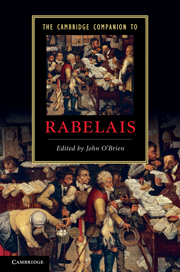Book contents
- Frontmatter
- 1 Introduction
- 2 Reading the works of Rabelais
- 3 Laughing in Rabelais, laughing with Rabelais
- 4 Interpretation in Rabelais, interpretation of Rabelais
- 5 Making sense of intertextuality
- 6 Pantagrueline humanism and Rabelaisian fiction
- 7 Putting religion in its place
- 8 Pantagrue and Gargantua: The political education of the king
- 9 Histories Natural and Unnatural
- 10 Reading and unraveling Rabelais through the Ages
- Guide to further reading
- Index
1 - Introduction
Published online by Cambridge University Press: 28 January 2011
- Frontmatter
- 1 Introduction
- 2 Reading the works of Rabelais
- 3 Laughing in Rabelais, laughing with Rabelais
- 4 Interpretation in Rabelais, interpretation of Rabelais
- 5 Making sense of intertextuality
- 6 Pantagrueline humanism and Rabelaisian fiction
- 7 Putting religion in its place
- 8 Pantagrue and Gargantua: The political education of the king
- 9 Histories Natural and Unnatural
- 10 Reading and unraveling Rabelais through the Ages
- Guide to further reading
- Index
Summary
“Most illustrious topers, and you, most precious poxies - for to you, not to others, my writings are dedicated - Alcibiades, in Plato's dialogue entitled The Symposium, praising his master Socrates, inconvertibly the prince of philosophers, among other things says he is like the Sileni.” (F3/H5) / Prologues fulfil a conventional role in early modern works. When they are addressed to a reader, as here, their aim is to explain and justify the work that immediately follows, highlighting its novel features and attempting to arouse the reader's interest and gain his or her sympathy. It is a rhetorical technique known as captatio benevolentiae, literally “the capturing of good will.” By those standards, the opening lines of the prologue of Gargantua far from fit this pattern, yet they present a set of features characteristic of Rabelais's work as a whole: a narrator who directly hails the reader; that reader addressed in scurrilous terms; a speech that then switches register and makes extensive reference to a classical text. From the threshold of the text - before even chapter 1 begins - the narrator introduces us to a worldwhose prime features are contradiction, tension, brought about, in this case, by the sudden change of cultural registers, the implicit characterization of the reader, the abolition of authorial distance, and the rapprochement between the narrator and his public.
- Type
- Chapter
- Information
- The Cambridge Companion to Rabelais , pp. 1 - 14Publisher: Cambridge University PressPrint publication year: 2010

